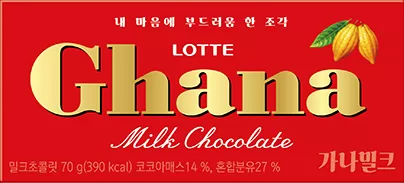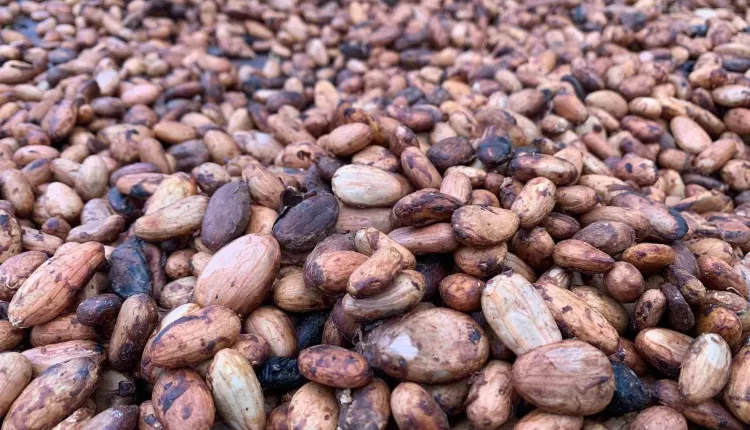In the world of chocolate connoisseurs and enthusiasts, Ghana has long been recognised as the heart and soul of cocoa production.
The West African nation plays a pivotal role in shaping the global chocolate industry. Beyond supplying a substantial portion of the world’s cocoa beans, its quality is unrivalled.
However, recent challenges faced by Ghana’s cocoa sector have raised concerns about the future of this vital ingredient and its impact on the beloved treat.
The country, which goes by the accolade “Cocoa is Ghana, Ghana is Cocoa,” has been a key player in the cocoa market for decades.
The country’s unique climate, fertile soil, and unique post-harvest processing technique make it a world leader in cocoa production, resulting in high-quality beans that are sought after by chocolate manufacturers globally.
Ghana Cocoa’s renowned quality and strong brand have earned it widespread brand associations by several confectionery giants, including Lotte Confectionery and Whittaker’s.

The cocoa industry in Ghana, however, is currently facing a confluence of challenges that could potentially reshape the dynamics of the chocolate market.
One significant issue is the impact of climate change on cocoa cultivation. Erratic weather patterns, including prolonged periods of drought and unpredictable rainfall, have affected cocoa yields, leading to a decline in production.
Farmers in Ghana, who depend heavily on cocoa as a primary source of income, are grappling with the consequences of these climatic shifts.
Many are being forced to adapt their farming practices or explore alternative crops, like oil palm, cashew, and rubber, to mitigate the risks posed by a changing climate.
This, in turn, raises questions about the future availability of high-quality Ghanaian cocoa for chocolate manufacturing.
In addition to climate-related challenges, issues such as disease and the prevalence of pests, ageing cocoa farms, and poor road infrastructure further compound the woes of Ghana’s cocoa industry.
The Cocoa Swollen Shoot Virus Disease (CSSVD), in particular, is doing significant damage to Ghana’s cocoa tree stock as infected trees die within three years. Unfortunately, the disease has no cure.
Affected farms must be cut out, treated, and replanted in line with recommended scientific protocols to prevent re-infection, as has been demonstrated under the national cocoa rehabilitation programme.
The CSSVD devastation has undoubtedly adversely impacted Ghana’s cocoa production output in the recent past, with the country’s domestic cocoa grinding taking a hit.
Ghana’s cocoa production woes are identified as contributing factors to the prevailing global chocolate supply chain pressure, and chocolate lovers around the world may soon feel the impact, if not already.
Some consumers are beginning to ask a fundamental question: Will chocolate still be chocolate without Ghana cocoa?
The distinctive flavour profile of Ghana cocoa, known for its rich and complex taste, has been a defining characteristic of many popular chocolate brands.
The potential scarcity or decline in the production of Ghanaian cocoa could lead to changes in the taste and texture of chocolate products on the market.
Major chocolate manufacturers are closely monitoring the situation in Ghana and exploring strategies to ensure a stable supply of cocoa for their products.
Some are investing in sustainable farming practices as part of their sustainability programmes, while others are diversifying their sources to include other cocoa-producing regions.
However, finding a perfect substitute for the unique characteristics of Ghanaian cocoa remains a challenge.
As discussions about the future of chocolate unfold, stakeholders in the cocoa industry, including governments, farmers, and international organisations, are being urged to collaborate on solutions that address the root causes of the challenges faced by Ghana’s cocoa sector.
In the coming years, chocolate lovers may witness changes in the chocolate they have grown to love as the industry adapts to the evolving landscape of cocoa production.
Whether chocolate can retain its essence without its heart and soul—Ghana cocoa—remains to be seen, but one thing is clear: the future of chocolate is at a crossroads, and the choices made today will shape the sweet indulgence enjoyed by millions around the world.
- Illegal Mining Threatening Ghana’s $230M Cocoa Rehabilitation - April 10, 2024
- Ghana Raises Cocoa Farmgate Price by 58.26% to GHC2,070 per bag - April 5, 2024
- New Standard for Measuring Cocoa Household Income Launched - April 5, 2024
